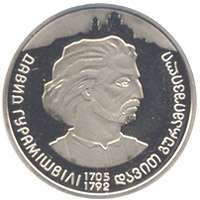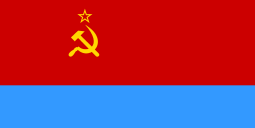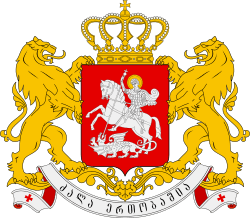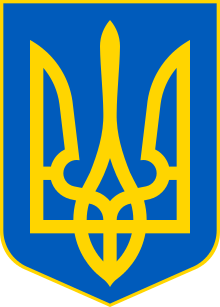Georgia–Ukraine relations
 |
|
Georgia |
Ukraine |
|---|---|
Georgian-Ukrainian relations are the relations between Georgia and Ukraine and between the Georgian and Ukrainian people in particular which lasts from the Middle Ages.

Early contacts
The first significant contact between Georgian and Ukrainian people occurred during the 18th century when a famous Georgian poet and distinguished officer David Guramishvili. David Guramishvili (1705–1792), an outstanding Georgian poet, whose life and creative work were closely bound up with Ukraine: in 1760 the poet settled down in Myrhorod, where he lived till the end of his life. Guramishvili's literary work was started in Georgia, but his poetic talent become fully apparent exactly in Ukraine. Autobiographical collected poems Davitiani (1787), the poet's most distinguished work, were created in Ukraine. His other poem "Joyous Spring" was full of sympathy towards peasants and had vivid Ukrainian colouring. The other noted emigrant, Prince Nikolay Tsertelev (Tsereteli, 1790–1869). Although Georgian by origin and Russian by education, he grew up in Ukraine and developed a deep attachments to its people, being one of the earliest enthusiasts of Ukrainian folklore and a staunch local patriot.[1]
The famous Ukrainian poet Lesya Ukrainka settled in Georgia in 1913 with her husband Klyment Kvitka. She died soon afterwards in Tbilisi. The poems of Ukrainka and Taras Shevchenko were translated into Georgian in 1922 (most of the poems of Shevchenko were taught in the Georgian schools before and during the Soviet period). Ukrainians and Georgians soon found themselves in the same political reality. Both countries opposed Russian domination and resisted Russification attempts by the Tsarist and later Soviet Russia.
Post-Revolution and Soviet era
After the Russian Revolution of 1917, both Georgia and Ukraine declared independence as the Democratic Republic of Georgia and the Ukrainian People's Republic respectively. The two republics accorded each other de jure recognition and established diplomatic ties. Victor Tevzaia was Georgia's first ambassador to Ukraine. Both nations were suppressed by the Soviets in 1921 and absorbed into the Soviet Union in 1922. Since 1936, Georgia and Ukraine were officially known as the Georgian Soviet Socialist Republic and the Ukrainian Soviet Socialist Republic.
In 1942, head of UON Stepan Bandera appealed to the Georgian nation to join his fight against the Soviet authorities and for national liberation. Many Georgians who left their country during the 1921 Red Army invasion of Georgia have settled in Poland. Many of them who had military education crossed into Ukraine and joined the Ukrainian Insurgent Army (Українська Повстанська Армія) against the Soviet regime. In 1943 UPA general Roman Shukhevych created the Georgian battalion of UPA (Грузинська дивізія УПА) which lasted until 1945. The total number of Georgians in UPA is unknown, however according to some sources, up to 2,000 Georgians served in various UPA detachments and battalions. Most of the Georgian volunteers of UPA were killed during the Soviet offensive on Ukraine and prisoners executed after the war.
In the last year of the existence of the Soviet Union, Ukraine participated in the union-wide referendum to preserve the Soviet Union in a different form made by Mikhail Gorbachev, while Georgia (aside from Abkhazia) did not. The next month, on April 9, Georgia declared independence from the Soviet Union while Ukraine, the second largest republic behind the Russian SFSR, did so on August 24 after the failed coup in Moscow two days earlier. Eventually, Ukraine held an referendum that took place on December 1 leaves with a 90% favor of independence. The secession ended the chances of the Union staying together, especially on a limited scale. The independence of both countries were recognized by the United States on December 25, 1991.
War in Abkhazia
In 1992, during the War in Abkhazia, the Ukrainian National Assembly called for volunteers to join their newly created military formation UNSO-Argo with intent to aid Georgian side against the Russian-backed Abkhaz separatists during the conflict.[2][3] UNSO-Argo (named after Argonauts) with its 150 fighters were deployed to Abkhazia and stationed in Gulripshi, Shroma, Tamishi and Sukhumi. During the full scale offensive by the Russian and Abkhaz sides in August 1993 on Shroma, Ukrainians managed to repel the attack but lost seven members of their battalion. However, on September 15, 1993 the Ukrainian battalion retreated from Shroma after being outnumbered by the Kuban Cossack formations. Some of the fighters of UNSO-Argo received Georgian medals of Vakhtang Gorgasal's Order, I class.
Current relations
.jpg)
Since their independence from the Soviet Union, both countries consider each other as strategic partners and have forged close political and cultural relations. During the Shevardnadze era, the Georgian government maintained its close relations with Ukraine. However, the relationship has further enhanced after Rose Revolution in Georgia and Orange Revolution in Ukraine. During the Orange Revolution, many Georgians rallied in Kiev in support of Victor Yushchenko. Both countries maintain pro-western political orientation and aspire to join NATO and the European Union. The close friendship between Presidents Mikheil Saakashvili and Viktor Yushchenko has also played an important role in recent political and cultural unity of the two countries. However, the cultural and political unity between two nations existed long ago. There are many cultural events in both courtiers, celebrating close relations between Georgian and Ukrainian people. In 2007, Georgians unveiled a statue to Taras Shevchenko in Tbilisi while Ukrainians erected the statue of Georgia’s epic poet Shota Rustaveli in Kiev. In 2015, Ukrainian president Petro Poroshenko appointed former Georgian President Mikheil Saakashvili as governor of Odessa Oblast, Ukraine's largest province.
The diplomatic relations between the two nations are realized at the level of embassies and consulates. The current Ambassadors Extraordinary and Plenipotentiary are Ukraine's Mykola Spys and Georgia's Grigol Katamadze.
See also
- GUAM Organization for Democracy and Economic Development
- Community of Democratic Choice
- Black Sea Forum for Partnership and Dialogue
References
- ↑ Subtelny, Orest (2000), Ukraine: A History, p. 128. University of Toronto Press, ISBN 0-8020-8390-0.
- ↑ Democratic Changes and Authoritarian Reactions in Russia, Ukraine, Belarus and Moldova (Democratization and Authoritarianism in Post-Communist Societies), Cambridge University Press, 1997, ISBN 0521597323 (page 349)
- ↑ State Building and Military Power in Russia and the New States of Eurasia (International Politics of Eurasia), M. E. Sharpe, 1995, ISBN 1563243601 (page 173)



